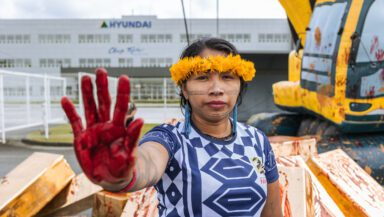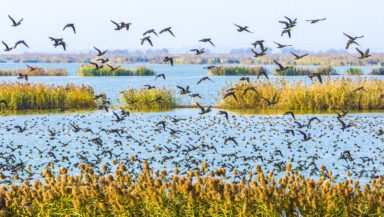SAO PAULO – Annual deforestation data (PRODES) released in Brazil at 1800hrs (GMT-3) today shows the highest rate of deforestation in the Amazon since 2008 with 11,088km2 deforested between August 2019 and July 2020. [1]
Cristiane Mazzetti, Greenpeace Brazil forests campaigner, said:
“This was already expected. Instead of acting to prevent the increase in deforestation, the federal government has been denying the reality, dismantling the agencies, restraining and attacking NGOs work. Because of the government’s anti-environmental policies, deforestation in Brazil is almost three times higher than the target for 2020 set by the country’s National Policy on Climate Change.” [2]
According to PRODES, the state of Pará was the most deforested in the Brazilian Amazon, followed by Mato Grosso, Amazonas and Rondônia. In Pará, the destruction advanced over protected areas, Indigenous lands and public lands. None of these areas were included in the field trip organized by the Brazilian government to show the Amazon to Ambassadors early this month. Meanwhile, Bolsonaro’s government has proposed a 35% reduction in the budget for environmental protection for 2021 and discusses repressing the activities of non-governmental organizations in the Amazon.
Across Europe, companies and investors have been responding to reports of escalating deforestation rates throughout 2020 by writing letters to the Brazilian government with little or no action taken by the Bolsonaro administration.
In May, 40+ UK companies including Tesco, Asda, Sainsburys and Burger King wrote to Brazilian Deputies and Senators expressing their concern at the rapid destruction of the Amazon, stating ‘What remains essential is that further destruction is halted.’ They warned that a so-called “land-grabbing bill” still expected to return to Congress next year would ‘put at risk the ability of organisations such as ours to continue sourcing from Brazil in the future’. [3]
In June, seven European investment firms announced they would divest from beef producers, grains traders and even government bonds in Brazil [4]. This was rapidly followed by UK investors expressing their concern that rising deforestation in the Amazon was “creating widespread uncertainty about the conditions for investing”[5]. In August, leading investment group Nordea divested from Brazil’s biggest meatpacking company, JBS, following concerns about the company’s environmental record and response to the COVID-19 pandemic [6].
Mazzetti continued:
“Bolsonaro’s actions are not only damaging the environment but also Brazil’s reputation internationally. Investors, banks, global companies and leaders have already signaled their concerns and threatened to pull out their investments from Brazil as they do not want to be associated with the environmental crimes and widespread destruction taking place in the country. Despite the negative numbers and pressure coming from different stakeholders, the government has not presented any meaningful plans to reduce deforestation.”
Fires often follow deforestation to clear land for industrial meat production and the latest fires data (to the end of October) for Brazil as a whole from Brazil’s National Institute for Space Research suggests an area of land larger than the UK has been burned so far this year [7].
In 2020, the Amazon rainforest saw its worst fire season in a decade and the Pantanal it’s worst since records began in 2002.
Anna Jones, head of forests at Greenpeace UK said:
“This year has been unprecedented in so many ways but to see deforestation still increasing in these globally important forests and habitats is beyond belief.
“Industrial meat and dairy is the biggest driver of deforestation and yet our supermarkets and fast food chains continue to serve it up to us day after day, knowing that its production is destroying forests, threatening the lives of Indigenous communities, endangering wildlife and worsening climate change.”
“If the words companies and investors have written to the Brazilian government over the last year mean anything, we should now be seeing them all end business with forest destroyers and our supermarkets and fast food chains rapidly replacing industrial meat with healthy, plant based food. The power to reduce deforestation lies directly with companies; the Amazon is already nearing a tipping point, there’s no time to waste.”
Earlier this month, President Bolsonaro announced plans to construct a legal framework to control NGOs in the Amazon and allow only those that ‘serve national interests’ to operate. In prompt response, 142 civil society organizations signed an open letter titled ‘It is in the national interest to ensure that NGOs are free to act’.
ENDS
Notes to editors
[1] The full data from PRODES for all years from 2004 can be found here:
http://www.obt.inpe.br/OBT/assuntos/programas/amazonia/prodes/
[2] Brazil’s deforestation target set by National Policy on Climate Change is available here (in Portuguese).
http://www.planalto.gov.br/ccivil_03/_Ato2015-2018/2018/Decreto/D9578.htm#art25
[3] In an open letter to Brazilian Deputies and Senators, 40+ companies including Burger King, Tesco, Asda and Sainsbury’s wrote:
“Should the measure pass, it would encourage further land grabbing and widespread deforestation which would jeopardise the survival of the Amazon and meeting the targets of the Paris Climate Change Agreement and undermine the rights of indigenous and traditional communities. We believe that it would also put at risk the ability of organisations such as ours to continue sourcing from Brazil in the future.”
https://www.retailsoygroup.org/wp-content/uploads/2020/05/Letter-from-Business-on-Amazon.pdf
Reference to letter from cross party UK MPs: https://twitter.com/BarrySheerman/status/1262725259301720065
[4] Reference to letter from European investment firms: https://www.reuters.com/article/us-brazil-environment-divestment-exclusi/exclusive-european-investors-threaten-brazil-divestment-over-deforestation-idUSKBN23Q1MU
[5] Letter from UK investors:
https://www.storebrand.no/en/asset-management/sustainable-investments/active-ownership/_/attachment/download/30ee3878-f76a-4379-bfc3-95da81215da0:0014db6c85fa65d95c3c21537e4bf41afe57355d/Open%20letter%20Brazilian%20embassy%20in%20Final%20070720.pdf
[6] Nordea divest from JBS:
https://uk.reuters.com/article/us-brazil-jbs-nordea/nordea-drops-jbs-shares-over-environment-covid-19-response-idUKKBN24X3VD
[7] Across the six terrestrial biomes in Brazil, 293,914km2 of land has burned so far in 2020 (data to end of October):
https://docs.google.com/spreadsheets/d/1XrWWu_4uOnYFNxKgE29O_AGi9H9LdbsZP_4AVijvceE/edit#gid=0
That’s an area larger than the size of the UK (242,495 km²).
Amazon: 74,339km2
Caatinga: 20,894km2
Cerrado: 136,578km2
Atlantic Forest: 17,415km2
Pampa: 6,071km2
Pantanal: 38,617km2



